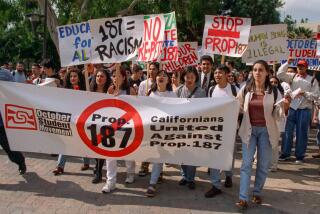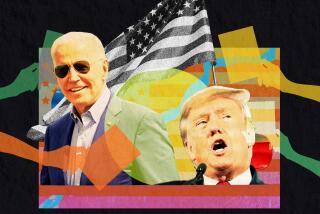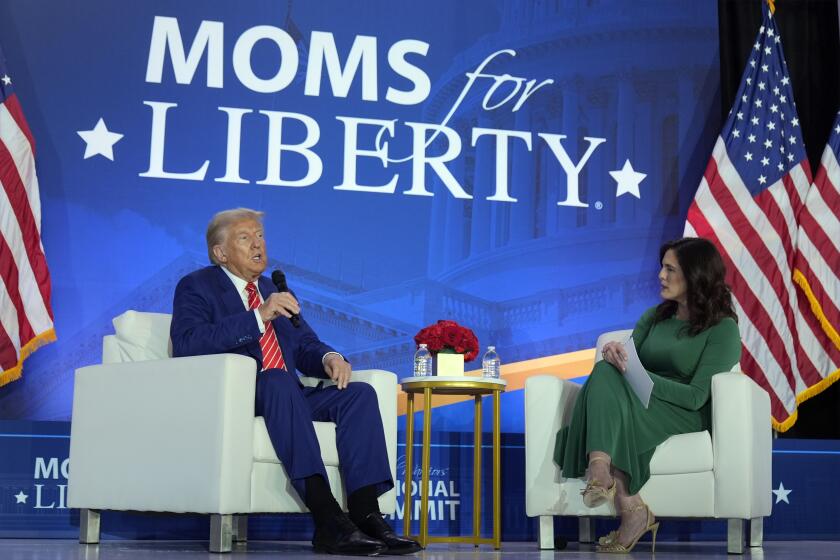Latinos Claim ‘90s as Their Power Decade at Convention : Politics: Reapportionment and a subsequent increase in electoral clout will transform lifestyles from the boardrooms to the barrios, 500 NALEO delegates hear.
If the decade of the ‘80s saw Latinos struggle to achieve political power in America, then the ‘90s will be the decade to wield that power, Latino leaders said Friday.
“The struggle has been to open the rooms where the decisions are being made,” said Andy Hernandez, president of the Southwest Voter Registration Education Project. “Now we’re in the room, and some of us in this room are sitting at the table.”
Latino politicians and activists from throughout the country told more than 500 delegates at the annual convention of the National Assn. of Latino Elected and Appointed Officials that their communities are poised for “profound change” because the upcoming reapportionment and subsequent increase in political clout will transform Latino lifestyles from the boardrooms to the barrios.
Based on the 1990 U.S. Census results, Latinos could add 12 seats to the 10 they now hold in Congress, said Richard Martinez, executive director of the Southwest Voter Registration Education Project, and within five years the Latino vote could be a deciding factor in national politics.
By 1996, California, Texas and New Mexico will be “Latino swing-vote states” in the presidential election, Martinez said. Because those states represent more than 30% of the electoral vote, he said, it is possible that “Latinos will elect the next President of the United States.”
Despite the glowing predictions, there were plenty of warnings that substantial obstacles still hinder the community’s ability to achieve its full potential.
Voter registration among Latinos still lags. And a major effort is needed to increase citizenship among Latinos in the United States, convention leaders said.
Henry Pachon, NALEO president, said that in 1988, for the first time, there were more non-citizen Latinos in America than there were registered Latino voters (4.8 million).
In terms of citizenship, Pachon said, the average Latino lives in the United States for 18 years before becoming a citizen; for Asian immigrants, the average delay is just five years.
Based on surveys, 63% of Latino immigrants say they want to become U.S. citizens. But largely because of a bureaucratic and unsympathetic process, Pachon said, just 25% are eventually naturalized.
“A 50% increase in our numbers does not lead to a 50% increase in our influence,” said Ruben Franco, president and general counsel of the Puerto Rican Legal Defense and Education Fund in New York.
Several leaders also said the future political clout of Latinos will significantly depend on avoiding divisive internal struggles and learning to share power with other minorities, particularly blacks.
In many areas of the country, the new political districts that might be open to Latinos could come at the expense of black political power. One such case is being negotiated by leaders from the two communities in Chicago.
“Very often in the Northeast, the Hispanic community either lives with or right next to an African-American community,” said Luis Caban, a voter registration activist from Chicago. “So, how do we push for districts where we may be taking away some power from an African-American community?”
In hope of unifying the Latino community and presenting a framework for working with other groups, several Latino organizations merged recently into a coalition, the National Hispanic Leadership Agenda, which hopes to gather momentum in time for the 1992 presidential election year.
The executive director of the nonpartisan policy coalition, Frank Cota-Robles Newton, said that “inclusiveness, not competitiveness,” is the coalition’s goal.
“I think that perception of factionalism within the Hispanic community has been true in the past,” NALEO’s Pachon said. “We have all grown up with the story of the Latino crab. . . . As one crab crawls out of the bucket, the other crab is pulling him down.”
But the coalition is hoping to demonstrate that there may be differences on issues, but there remain advantages to working together.
“However we get there, the end of the road is the same place,” said Antonia Hernandez, president of the Mexican American Legal Defense and Educational Fund and one of the coalition’s five co-chairs.
In the past, Latinos lacked credibility and were ineffective in Washington because they did not speak with one voice, the coalition’s Newton said.
As soon as one organization elected a new president, he said, that official would make the usual courtesy calls, only to be followed by the newly elected president of another Latino organization.
“We are being overlooked, ignored, not being paid attention to,” Newton added. “Together, they (federal officials) cannot ignore us.”
The cooperative spirit has been practiced in recent years by groups such as MALDEF, NALEO and the Southwest Voter Registration Education Project, Pachon said.
The organizations are working on “political empowerment”--attempting to turn immigrants into citizens, increase voter registration and file lawsuits to change local election systems to increase the clout of minority voters at the polls, Pachon said.
Some leaders at the convention disagreed about the gravity of the hurdles still to come.
Pachon said that without major effort, the community is still in danger of slipping out of a position of influence.
“There are really two alternative futures,” he said. “One is to be the perpetual underclass, and the other is to be a power sharer. And to be a power sharer, you have to work.”
On the other hand, said Hernandez of MALDEF, it is time for the Latino community to transform the machinery of its political efforts from one focused on greater participation to one that crusades for a Latino agenda of issues.
“We’re going to win the battle of the numbers, that’s inevitable,” she said. “We need to wage the war of ideas.”
The featured speaker for the convention Friday was U.S. Housing and Urban Development Secretary Jack Kemp, who gave a rousing speech about the need for economic mechanisms and incentives to resolve the social and community problems in America’s urban cores.
“There is no educational opportunity, no legal opportunity, no political opportunity without economic opportunity,” Kemp told the audience. “. . . You and I have a social and moral obligation to remove the barriers that are keeping people frozen out of home ownership.”
The conventioneers also distributed a petition urging President Bush to replace outgoing Supreme Court Justice Thurgood Marshall with a Latino. The resolution urged the President “to consider and appoint one of the many qualified Latinos now sitting in many federal courts.”
If Bush did that, NALEO’s Pachon said, “it would ensure President Bush’s place in history.”
SANTA ANA TARGETED
City is on top-five list for legal challenge on voting fairness. A1
More to Read
Get the L.A. Times Politics newsletter
Deeply reported insights into legislation, politics and policy from Sacramento, Washington and beyond. In your inbox three times per week.
You may occasionally receive promotional content from the Los Angeles Times.






